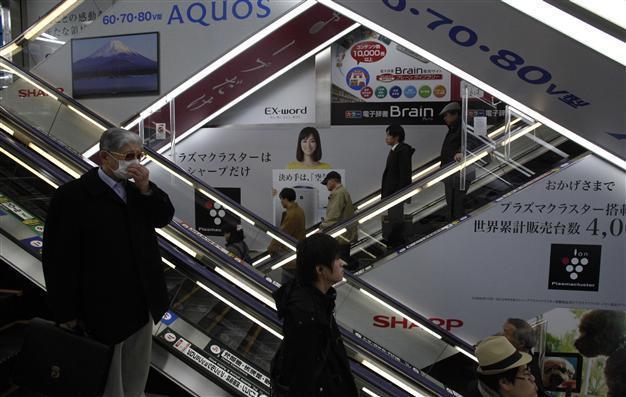Sharp announces $111 million tie-up with Samsung
TOKYO - Agence France-Presse

Advertisements for Sharp are seen at a train station in Tokyo March 6, 2013. REUTERS photo
Sharp on Wednesday announced a $111 million capital tie-up deal with South Korean rival Samsung, in a rare move for a Japanese firm that underscores the fading fortunes of its electronics giants.
Sharp, which is scrambling to repair its battered balance sheet, said Samsung would buy 10.4 billion yen of new shares, or a three-percent stake in the Japanese firm, making the smartphone and tablet maker its biggest foreign shareholder.
Reports of the deal Wednesday sent Sharp shares soaring more than 17 percent in early trade before ending 14.04 percent higher. Samsung was up 0.65 percent. The pact was announced after the Tokyo and Seoul markets had closed.
The Japanese firm said the deal would help shore up its troubled finances while boosting "mutual trust" as the firms look to benefit from Sharp's leading liquid-crystal display technology for mobile phones and tablets.
Samsung said the investment "would lay a firm foundation...to secure a steady supply of LCD panels from diversified sources".
Sharp, which has announced a separate 4.94 billion yen capital injection deal by US chipmaker Qualcomm, is also major panel supplier to Samsung rival Apple.
Last month, reports said an expected investment in Sharp by Taiwan's Hon Hai Precision, which makes Apple gadgets in China, had been shelved.
The decision to accept a capital injection from foreign firms marks a major comedown for both Sharp and Japan's manufacturers, said Hiroshi Sakai, chief economist with SMBC Friend Research Centre.
"For Japan, it is symbolic and shocking news as Sharp, which used to be a frontrunner in the panel industry, is struggling while its rival Samsung has raced past it," he said.
He added that the news "should not be any surprise" given Samsung's leading position in the global electronics market.
However, the deal will not solve all of Sharp's woes, he added, as the firm cuts jobs and overhauls its business after saying in February its loss in the nine months to December had doubled to about $4.6 billion.
Given the sector's struggles, deals between Japanese and foreign rivals are likely to increase, Sakai said.
"Many other Japanese electronics makers are struggling to survive. But they still have attractive technologies and some foreign rivals are quite interested in them," he said.
Japan's electronics giants have suffered myriad problems including a strong yen, weak demand in key export markets, fierce competition especially in their struggling TV divisions and strategic mistakes that ruined their finances.
Sharp -- which last year warned over its own survival and put up its Osaka headquarters as collateral to clinch crucial bank loans -- has been hammered by lower-cost rivals in its liquid-crystal display business.
Rival Sony, meanwhile, is selling off its headquarters in Manhattan and a major building in Tokyo to raise cash, while Panasonic is undergoing a similar painful restructuring after losing about $6.77 billion in the nine months to December.
The Samsung-Sharp deal gives the South Korean company more access to the market without investing in new production plants, analysts said.
Investors cheered reports of the deal on expectations it would usher in higher output at Sharp's flat-panel manufacturing plants, said Toshiyuki Kanayama, senior market analyst at Monex Inc.
"Investors are expecting that Samsung's significant sales force would contribute to Sharp plants' operation rates, as demand from Apple is declining," he said.
Sharp expects to close its fiscal year to March with a net loss of 450 billion yen, but has backed off earlier warnings over its ability to survive.
